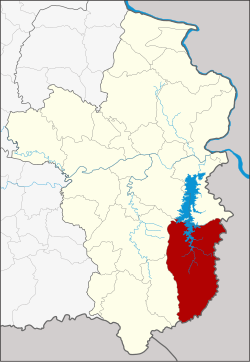Buntharik district
Buntharik
บุณฑริก | |
|---|---|
 District location in Ubon Ratchathani province | |
| Coordinates: 14°45′24″N 105°24′41″E / 14.75667°N 105.41139°E | |
| Country | Thailand |
| Province | Ubon Ratchathani |
| Seat | Phon Ngam |
| Area | |
• Total | 1,402.0 km2 (541.3 sq mi) |
| Population (2005) | |
• Total | 88,052 |
| • Density | 62.8/km2 (163/sq mi) |
| Time zone | UTC+7 (ICT) |
| Postal code | 34230 |
| Geocode | 3410 |
Buntharik (Thai: บุณฑริก, pronounced [būn.tʰā.rík]; Northeastern Thai: บุณฑริก, pronounced [būn.tʰā.lìk]) is a district (amphoe) in the southeastern part of Ubon Ratchathani province, northeastern Thailand.
History
[edit]King Nak of Champasak proposed that King Mongkut (Rama IV) establish Mueang Bua, which is now in the area of Ban Kong Krachu, Tambon Phon Sawan, Na Chaluai district. Later Phra Aphai (พระอภัย), the governor moved the town center to Ban Huai Po. In 1859 the next governor, Luang Buntharik Khettanurak (Sai) moved the town center to Ban Non Sung but keep the name Mueang Bua. The government made Buntharik a minor district (king amphoe) in 1923, and moved the town center to Ban Phon Ngam, on the east bank of the Dom Noi River. The district was subsequently named Phon Ngam. In 1939 it was renamed Buntharik.[1] It was upgraded to a full district on 22 July 1958.[2]
Geography
[edit]Neighboring districts are (from the west clockwise) Na Chaluai, Det Udom, Phibun Mangsahan, Sirindhorn and the Laotian province of Champasak.
The important water resource is the Dom Noi River.
Administration
[edit]The district is divided into eight sub-districts (tambons), which are further subdivided into 108 villages (mubans). Bua Ngam is a township (thesaban tambon) which covers parts of the tambon Bua Ngam. There are a further eight tambon administrative organizations (TAO).
| No. | Name | Thai name | Villages | Pop. | |
|---|---|---|---|---|---|
| 1. | Phon Ngam | โพนงาม | 13 | 11,339 | |
| 2. | Huai Kha | ห้วยข่า | 20 | 15,468 | |
| 3. | Kho Laen | คอแลน | 16 | 12,031 | |
| 4. | Na Pho | นาโพธิ์ | 10 | 8,617 | |
| 5. | Nong Sano | หนองสะโน | 18 | 16,552 | |
| 6. | Non Kho | โนนค้อ | 9 | 6,395 | |
| 7. | Bua Ngam | บัวงาม | 12 | 9,949 | |
| 8. | Ban Maet | บ้านแมด | 10 | 7,701 |
Economy
[edit]Ban Sompornrat village in the district has become known for its hand-woven and dyed silk fabrics. Queen Sirikit, on a visit to the village on 16 November 1994, was taken by the excellence of local silks. She included the weavers in her Silapacheep ('artistic profession') project and promoted their crafts. In 2018, the village's Silapacheep Centre's membership has over 500 craftspeople from across Ubon. They produce muk jok dao ('whale silk fabric') sarongs, costing up to 5,000 baht per metre. Members of the group earn more than 20,000 baht per month, far more than the 5,000 baht previously. The project also exports silk cocoons to Japan.[3]
References
[edit]- ^ พระราชกฤษฎีกาเปลี่ยนนามอำเภอ กิ่งอำเภอ และตำบลบางแห่ง พุทธศักราช ๒๔๘๒ (PDF). Royal Gazette (in Thai). 56 (ก): 354–364. April 17, 1939. Archived from the original (PDF) on February 19, 2009.
- ^ พระราชกฤษฎีกาจัดตั้งอำเภอกระสัง ... (PDF). Royal Gazette (in Thai). 75 (55 ก): 321–327. July 22, 1958. Archived from the original (PDF) on April 6, 2012.
- ^ Theparat, Chatrudee (3 September 2018). "Worming out of poverty". Bangkok Post. Retrieved 3 September 2018.
External links
[edit]- amphoe.com
- Amphoe information of Ubon Ratchathani Province Archived 2009-06-12 at the Wayback Machine
